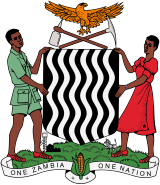
Een artikel in The Economist over de Zambiaanse verkiezingen dat hier verder onvertaald is te lezen:
Zambia’s election: Cobra vs Codger
Different in style, the main candidates are not that far apart in policy.
Sep 17th 2011 | LUSAKA | from the print edition
Sata gets smarter
RANKED less than a decade ago one of poorest countries in the world, Zambia is booming, at any rate on paper. The economy has grown by an annual average of some 6% for the past five years and may exceed 7% this year. What better moment for President Rupiah Banda and his ruling Movement for Multiparty Democracy (MMD) to be facing a general election on September 20th?
Yet the outcome is far from certain. Opinion polls, never reliable in this vast tropical country of 13m people, produce wildly opposing results. One, published on September 8th in the relentlessly pro-government Times of Zambia, gives the MMD the edge with 41% of the vote, against 36% for the Patriotic Front (PF), the main opposition party, led by Michael Sata. But another, published on September 13th in the supposedly independent but in fact fiercely pro-Sata Post, puts the PF in a clear lead with 55%, giving the party 87 seats in the 150-member parliament, twice its present size, with the MMD getting only 34.
In this section
Related topics
This is making investors nervous. In the past, the ever-changing Mr Sata, who nowadays presents himself as a champion of the poor, has threatened to nationalise the mines and throw out the Chinese, one of the country’s biggest investors, claiming that they are “only out to exploit us”. This time he has toned down his anti-Chinese language—perhaps because of a growing realisation of the importance of Chinese cash to Zambia’s future prosperity, or perhaps, it is whispered, because he is no longer able to get his campaign funds from the Taiwanese and has therefore himself turned to the Chinese. Whatever the reason, Mr Sata is seen as unpredictable.
A minister in Kenneth Kaunda’s United National Independence Party, which ran Zambia from independence in 1964 until its defeat in 1991, Mr Sata fell out with the country’s founding president and joined the MMD, holding various portfolios under President Frederick Chiluba, before falling out with him as well and setting up his own party in 2001.
With the MMD in power for the past 20 years, many Zambians, especially the unemployed urban youth, yearn for change. This is what the 74-year-old Mr Sata, who is the same age as Mr Banda, is promising, under the slogan of “more jobs, less taxes and more money in your pockets”. He is a charismatic and populist orator. Known as King Cobra, he creates more fizz than his stolid, avuncular rival. But how he plans to deliver change is unclear. His friends say he knows how to “get things done”.
At independence from Britain, Zambia (previously Northern Rhodesia) was among Africa’s richest countries. But within a couple of decades it had become one of the poorest, largely as a result of nationalisation, mismanagement, plummeting copper prices and soaring debt. The gradual reversal of those trends after Mr Kaunda’s fall from power in 1991, coupled with foreign aid and debt relief, has helped to boost the recent recovery. But most Zambians have personally yet to enjoy their new-found prosperity. Around two-thirds of them, mostly subsistence farmers, still live on less than $2 a day.
This is why Mr Banda, with his slogan of “security, stability and prosperity”, is not the shoo-in that might be expected. He is banking on support from the rural poor, who have benefited from generous subsidies for fertiliser and seed, and from the emerging middle class, nervous lest its standard of living fall under a more populist president. Despite the rhetoric, however, the policies of the two main candidates look much the same. Whoever wins, there is unlikely to be a big shift to the left or right.
